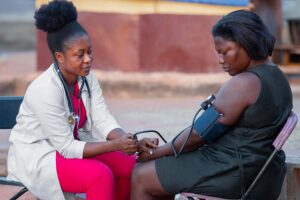As parents, we always strive to make the best decisions for our children’s health and future. One decision that could be crucial in securing your child’s health is cord blood banking. You may be wondering how this process works and whether it’s worth it. In this article, we explore why banking your baby’s cord blood is an investment that could one day save their life, and how Oneus in Nigeria is here to guide you through this life-saving process.
What Is Cord Blood Banking?
Cord blood banking is the process of collecting and storing the blood from your baby’s umbilical cord immediately after birth. This blood contains stem cells, which are powerful agents in treating various medical conditions. Stem cells can regenerate healthy tissues and treat diseases like leukemia, lymphoma, and even genetic disorders.
Unlike traditional blood donations, cord blood is an untouched resource at birth, and it offers a unique opportunity for future medical interventions. For many families, private cord blood banking offers a sense of security, knowing their child’s cells could be used to treat life-threatening conditions.
Why is Cord Blood Banking Important?
Nigeria has made significant progress in medical treatments, but there is still a gap when it comes to access to specialized care. Stem cell therapies are still relatively new in Africa, but they have proven life-saving potential worldwide. Banking cord blood offers an opportunity to safeguard your child’s health, and could be the key to saving their life in the future.
Here’s why it matters:
-
Access to Advanced Treatment – Stem cells from cord blood are already being used in the treatment of several diseases, including cancer, sickle cell anemia, and genetic disorders.
-
Match for Blood Group and Genotype – When your child’s blood is needed for treatment later, cord blood is often a perfect match, especially if the child is diagnosed with a condition that requires stem cell transplantation.
-
Growing Awareness in Nigeria – Many people in Nigeria are still unaware of the importance of cord blood banking. But as awareness grows, the potential to save lives becomes even greater.
-
Cost of Cord Blood Banking – While many parents are concerned about the cost of banking cord blood, it is crucial to weigh this expense against the immense value of securing a potential life-saving resource for your child. Oneus in Nigeria provides affordable options for private cord blood banking, ensuring that your child’s future health is protected without financial burden.
Why Choose Oneus for Cord Blood Banking?
Oneus in Nigeria is a trusted provider of umbilical cord blood banking services. Their unique value proposition lies in offering reliable, high-quality cord blood storage solutions to Nigerian families. With expertise in stem cell collection and storage, Oneus ensures your child’s cord blood is stored safely and securely for future use.
In addition to cord blood banking, Oneus provides valuable insights into blood donation and other life-saving procedures, including plasma donation and bone marrow donation. With a commitment to advancing health and saving lives, Oneus is dedicated to offering comprehensive services for the future of your family’s health.
How Cord Blood Banking Can Help Your Child
When a child faces a health crisis, having access to stored stem cells can make all the difference. Here are some conditions where cord blood banking has been proven to be life-saving:
-
Leukemia and Lymphoma – Diseases that affect blood and bone marrow can be treated with stem cells from cord blood.
-
Sickle Cell Anemia – This genetic blood disorder, prevalent in Nigeria, can be managed and even cured with stem cell transplants from cord blood.
-
Cerebral Palsy – Research is ongoing, but there is hope that stem cells can aid in the treatment of this neurological disorder.
-
Genetic Disorders – Stem cell donation can help treat children with inherited genetic diseases, offering them a chance for a healthier future.

Blood Donation: A Lifeline for Everyone
Beyond cord blood banking, blood donation remains an essential part of saving lives. Blood donation benefits extend to both the recipient and the donor. Donating blood can help save lives in emergency situations or when individuals need surgeries, cancer treatments, or those suffering from trauma.
In Nigeria, blood shortages are common, making it difficult for hospitals to meet the demand. If you are considering blood plasma donation or platelet donation, remember that you can contribute to saving lives. Blood centers and plasma donation centers like Oneus make it easy to donate safely.
Risks of Not Donating Blood
Not donating blood when possible can contribute to a severe shortage. This means fewer lives can be saved, especially in critical situations. If you’re healthy and eligible, giving blood could be your chance to make a difference. Regular blood donations can also provide blood donation benefits to the skin, improving circulation and health overall.
Conclusion: Give Blood, Save a Life
Cord blood banking is an investment in your child’s future. It offers an invaluable resource that could one day save their life, or someone else’s, when an illness strikes. Oneus in Nigeria is your trusted partner in ensuring that your child’s health is protected with private cord blood banking services.
Take action now – Give Blood, Save a Life. Book your donation today with Oneus by contacting us at info@oneusng.com or calling +234 902 168 2822. Visit us at Oneusng.com to learn more about how you can make a lasting impact on your family’s future.
Secure your child’s health today – tomorrow may depend on it.




